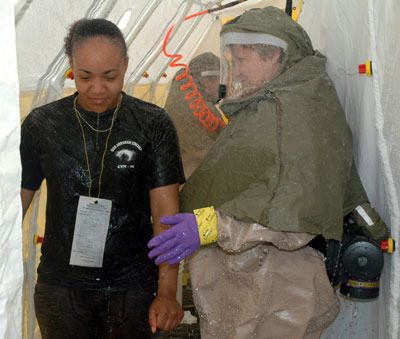ARLINGTON — The scenario was potentially life-threatening. Eight sailors from Naval Station Everett were transported from the scene of a toxic chemical spill on base to a portable decontamination tent outside of the Cascade Valley Hospital in Arlington.
Fortunately for all involved, the scenario was only a training exercise, named “Reliant Cloud,” whose purpose was to test the emergency response readiness of personnel from Navy Branch Health Clinic Everett, the city of Everett’s police and fire departments, and the Cascade Valley Hospital on Wednesday, July 25.
For the eight enlisted sailors who laughed about being “volun-told” to take part in the exercise, it was educational and even refreshing to be moved through the two sides of the portable decontamination tent, the one side for patients who can still walk on their own, and the other for patients who need to be moved via stretcher.
In spite of hospital personnel’s concerns that the initial blasts of water had been too cold for their first few simulated patients, all of the sailors agreed that the warm water and even the scrubbing brushes had felt pleasant.
As many Cascade Valley Hospital personnel as Naval Station Everett sailors were available to run through the exercise on site, and the various nurses and technicians concurred with Tammy LeBoeuf, the radiology technician who supervised the exercise, that it proceeded smoothly enough to encourage them for how they might handle the real thing.
“We’re always on standby with Naval Station Everett,” said LeBoeuf, who noted that Cascade Valley Hospital not only stores equipment that’s suited to such situations in emergency preparation trailers, but also within the hospital building itself, which also includes a decontamination shower that’s permanently installed as part of the emergency room. “If this really was a mass incident, our trailers and tent would more than likely be stationed in front of the hospital, rather than in back as they were in this exercise.”
LeBoeuf praised her team members for suiting up and scrubbing down their patients not only quickly, but also thoroughly, which is no mean feat when you can’t actually dress yourself.
“They made sure one another’s suits were as secure as they would need to be in a real situation,” LeBoeuf said. “You can’t just zip yourself up in these suits, because you also need someone else to tape you in.”
In an actual event, decontamination personnel would only be able to remain in their suits for half an hour each before trading out, but “Reliant Cloud” went so briskly at Cascade Valley Hospital that even the more restrictive limit of 15 minutes per decontamination worker in hot conditions was never reached.
“We always check everyone’s vitals before we strap them in, because we don’t want them to have medical emergencies of their own while they’re helping others,” LeBoeuf said. “If they need to tap out, they just pat themselves on the head. It’s not just one department at the hospital that contributes staff to this team, either.”
Of the team members that were assembled on July 25, only two hadn’t previously participated in the quarterly training exercise, although it was LeBoeuf’s first time running the show.
“We’ve gotten more familiar with the equipment as time has gone on,” said registered nurse Carole Faulkner.
“We’re much more organized now,” said Carole Rhinevault.
“We were short a few people, but we improvised,” said LPN/OB Tech Ardis Fureby.
“This is a really good crew, and these drills are really helpful to the outside community,” said LeBoeuf, who pointed out that chemical decontamination is no mere hypothetical scenario for Cascade Valley Hospital, which treated patients who were accidentally exposed to tear gas in Darrington last year. “The more we do them, the better we’ll be.”







